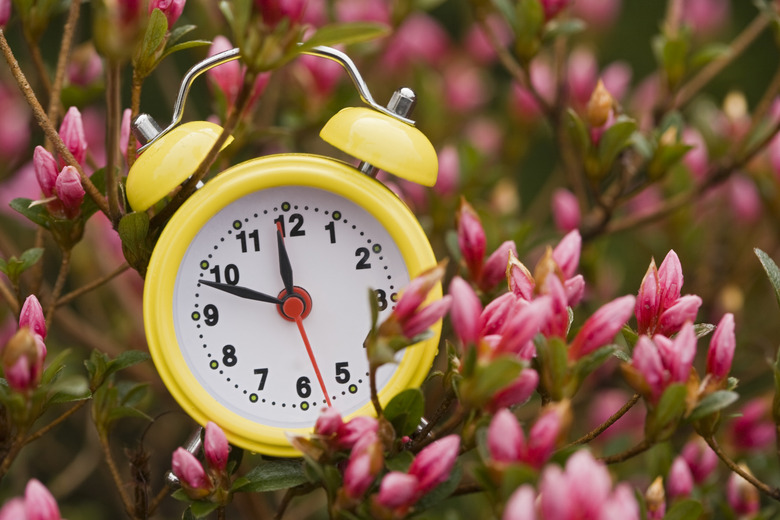Your Daylight Saving Time Survival Guide
The start of spring means a few things. You'll be spending more time outside, munching on fresh spring salads, and doing some spring cleaning. But you'll also have to deal with daylight saving time. It happens every year, but somehow the switch never fails to be a hassle.
At 2 a.m., the clock jumps to 3 a.m. The sun will rise later in the morning and set later in the evening. All you'll miss is one meager hour of sleep.
Every year, daylight saving time falls on a Sunday. This is no coincidence — daylight saving time was designed this way so that the time swap is as convenient as possible. And unless you work in the food industry, a hospital, or some other profession that demands your weekend, it's likely you have the day off and can sleep in.
But just one missing hour of sleep can cause more distress than you might think. Many people find themselves feeling groggy, overdoing it on caffeine, and generally feeling blue. Here are some things you can do to help plan ahead and avoid the slump.
Know when the bar closes
Every year, the clock springs forward on a Sunday. This means on Saturday, some people will stay out until the clocks change at 2 a.m. But will the bar still be open? The exact time you should expect last call depends on your state's laws. In New York, partiers are going to miss out on an hour of drinking when the clocks change at 2 a.m. The bars close at 4, meaning the hour from 2 to 3 will simply vanish. But for states where closing time falls at 2, the bar will probably close at the same time as usual — only the clocks will technically say it's 3 a.m. when it's finally time to leave your local dive bar.
Go to bed 15 minutes earlier every night
If you're trying to do daylight saving time the healthy way, you're probably more worried about how you'll manage to get enough sleep with the switch. The key is to ease into it. If you plan to go to bed a whole hour earlier all at once, you might have trouble falling asleep. Four days ahead of time, start going to bed 15 minutes earlier. Each night, add on another 15 minutes until you've earned back your full hour of lost time.
Power down
Screens mess with your circadian clock — watching Netflix before bed could be the reason you have trouble falling asleep. It's going to be hard enough to get to bed early the night before the clocks spring forward. Consider powering down all of your electronics an hour before bed.
Limit alcohol and caffeine
Both of these substances aren't as bad for you as you might think. In fact, some studies show that coffee and wine could help you live longer. But if your concern is getting enough rest, it's best to hold off. Alcohol and caffeine can prevent you from getting deep sleep.
Be strategic with your snacking
Food and sleep have more to do with each other than you might think. Some foods can even affect your dreams! Certain foods can also keep you up at night. If you're snacking before bed, avoid these foods and consider drinking a calming beverage to help you sleep well.
Keep stress at a minimum
Stress and anxiety really do keep you up at night. You probably know the feeling. You're lying there, ready to fall asleep, when suddenly your mind starts to race with worries and worst-case-scenario imaginings. There are ways to avoid that trap. Assess your habits to make sure you're not falling into patterns that can make your anxiety worse. Then, try to indulge in a calming meditation or other stress management technique to calm down your mind.
Create a bedtime ritual
Bedtime rituals can help reduce anxiety and prime your brain to want to fall asleep. Something as simple as washing your face and taking a few deep breaths can put you in the best state of mind to avoid getting restless or lying awake.
Change your clocks on time
The clocks officially switch at 3 a.m. — meaning that at 2 a.m., the time jumps an hour ahead. If you're setting alarms for Sunday morning for any reason, keep that in mind and be sure to change any clocks that don't change automatically once you wake up.
Sleep in (if you can)
If you can have a late Sunday morning and get some extra rest, it's probably a good idea. Just because the night lost an hour doesn't mean you have to lose an hour of sleep! Sleep in, keep the shades drawn, and wake up slowly. Once you're up, treat yourself to an amazing brunch.
Eat a healthy breakfast
What you eat for breakfast makes a big difference in how you're going to feel for the rest of the day. If you had a night of really bad sleep or are feeling sleep-deprived, eggs and toast can help you recover. If that doesn't sound good to you, try one of these healthy breakfast ideas.
Get active
Nothing helps to boost energy and help you get the rest you need like exercise. Even just going for a walk outside can help to ensure better sleep.
Spend time in the sunshine
If you start feeling tired the day after daylight savings begins, it could be a good idea to step outside for a bit. Sunshine triggers the body to stop producing the sleep hormone, melatonin. Plus, you really need vitamin D.
More From The Daily Meal:
Spring Superfoods You Should Be Eating
What Your Body Is Trying to Tell You With These 20 Symptoms
19 Facts About Diet Soda That Might Make You Finally Stop Drinking It
I Drank Bone Broth Every Day for a Month and Here's How It Went












